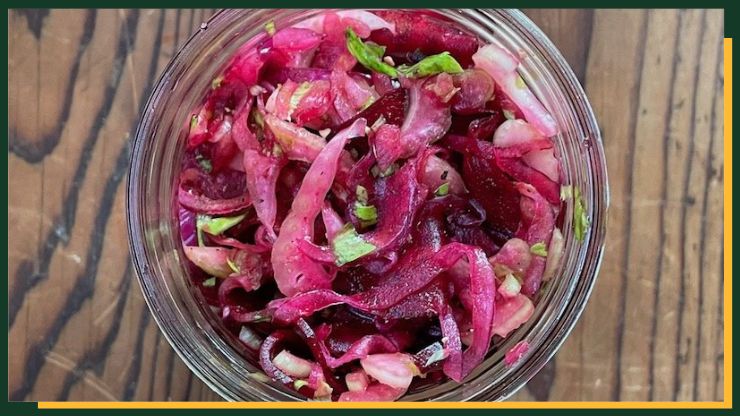Fermented Beet Salad offers a delightful twist to traditional salads, harnessing the power of natural fermentation for both flavor and health benefits. Fermentation not only enhances the earthy sweetness of beets but also introduces probiotics, promoting gut health.
This culinary adventure involves transforming fresh, crisp beets into a tangy, slightly effervescent dish, brimming with character. As we delve into the art of fermentation, we unlock a world of complex flavors, heightened nutritional value, and a captivating texture.
Beyond its vibrant hues and enticing aroma, this salad showcases the marriage of simplicity and sophistication, inviting you to savor a crisp, probiotic-rich symphony with every bite. Embrace the transformative journey of Fermented Beet Salad and elevate your culinary experience with a dish that celebrates the harmony of nature and fermentation.
Health benefits of fermented foods
Fermented foods offer a spectrum of health benefits, contributing to overall well-being through various mechanisms:
- Probiotics: Fermentation introduces beneficial bacteria, such as Lactobacillus and Bifidobacterium, into the food. These probiotics promote a healthy balance of gut microbiota, supporting digestion and immune function.
- Improved Digestion: Probiotics in fermented foods aid in breaking down and absorbing nutrients, enhancing overall digestive efficiency. This can alleviate issues such as bloating and irritable bowel syndrome (IBS).
- Nutrient Enhancement: Fermentation can increase the bioavailability of certain nutrients, making them easier for the body to absorb. For example, fermentation of soybeans enhances the availability of essential amino acids.
- Vitamin Synthesis: Some fermented foods, like sauerkraut and kimchi, are rich in B vitamins and vitamin K, which are produced during the fermentation process.
- Lactose Digestion: Fermented dairy products, such as yogurt and kefir, are often better tolerated by individuals with lactose intolerance because the fermentation process reduces lactose content.
- Immune System Support: The gut is a significant player in the immune system, and a balanced microbiome achieved through the consumption of fermented foods can positively impact immune function.
- Reduced Inflammation: Fermented foods may help reduce inflammation in the body. The probiotics they contain can modulate the immune response and lower the production of pro-inflammatory compounds.
- Mood and Mental Health: There is emerging research on the gut-brain connection, suggesting that a healthy gut microbiome may positively influence mental health and mood. Fermented foods could play a role in supporting this connection.
Also, Read – Do Fermented Foods Help You Lose Weight
Ingredients
For Fermented Beet Salad, you’ll need fresh organic beets, non-iodized salt (such as sea salt or kosher salt), and water to create a brine. Optional ingredients include garlic, dill, coriander seeds, or other herbs and spices for added flavor.
You may also choose to include additional salad components like greens, feta cheese, or nuts for a diverse texture. Ensure you have a glass jar or fermentation crock, a mandoline or sharp knife for slicing, a mixing bowl, and a weight or fermentation weight to keep the beets submerged during the fermentation process. Simple yet quality ingredients come together to create this vibrant and healthful dish.
Don't just scroll, subscribe!
BuzzTrail's unique web-stories are the cure for boredom you've been waiting for.
Equipment
To prepare Fermented Beet Salad, gather essential equipment for a seamless fermentation process. You’ll need a glass jar or fermentation crock to house the beets, a mandoline or sharp knife for uniform slicing, a cutting board, and a mixing bowl for brine preparation. Ensure you have a weight or fermentation weight to keep the beets submerged, creating an anaerobic environment.
Cover the jar with cheesecloth or a coffee filter to allow gases to escape during fermentation. These basic yet crucial tools, combined with attention to detail, will facilitate the successful fermentation of your beets, resulting in a flavorful and probiotic-rich salad.
Also, Read – Easy Fermented Foods for Cookouts
Fermentation Process

The fermentation process for your Beet Salad involves several key steps to ensure a successful and flavorful outcome:
- Prepare Beets:
- Peel and uniformly slice fresh, organic beets. Optional: shred or julienne for varied texture.
- Create Brine:
- Mix non-iodized salt with water to create a brine solution. Ensure proper salt concentration for fermentation.
- Combine Beets and Brine:
- Layer sliced beets in a glass jar or fermentation crock.
- Pour the brine over the beets, covering them completely.
- Add Flavorings (Optional):
- Include garlic, dill, coriander seeds, or preferred herbs and spices for enhanced flavor.
- Weigh Down the Beets:
- Place a weight on top to keep beets submerged, creating an anaerobic environment necessary for fermentation.
- Cover and Ferment:
- Cover the jar with cheesecloth or a coffee filter, securing it with a rubber band.
- Allow the beets to ferment at room temperature for a specified time, typically 7-14 days, depending on desired tanginess.
- Monitor Fermentation:
- Check for bubbles and signs of fermentation.
- Adjust weight and water level as needed.
- Taste the beets periodically to gauge fermentation progress.
- Storage and Serving:
- Transfer the fermented beets to a storage container and refrigerate to slow down fermentation.
- Serve the Fermented Beet Salad as a standalone side dish or mixed with greens, feta cheese, nuts, or other preferred ingredients.
By following these steps, you’ll achieve a delicious Fermented Beet Salad, rich in probiotics and boasting a unique, tangy flavor profile.
Conclusion
In conclusion, the Fermented Beet Salad not only tantalizes the taste buds with its vibrant flavors but also offers a potent dose of probiotics and enhanced nutritional benefits. This transformative journey through fermentation marries simplicity and sophistication, showcasing the harmony of nature in a crisp and probiotic-rich symphony.
Embrace the healthful and flavorful legacy of this dish, elevating your culinary experience while promoting gut health. Incorporate Fermented Beet Salad into your repertoire, celebrating the marriage of freshness, fermentation, and well-being in each delightful bite.
FAQs
How long does it take for the beets to ferment?
How long does it take for the beets to ferment?
Fermentation time varies but typically ranges from 7 to 14 days. Taste the beets periodically to achieve your desired level of tanginess.
Can I use different herbs and spices in the fermentation process?
Can I use different herbs and spices in the fermentation process?
Absolutely! Experiment with various herbs and spices like garlic, dill, or coriander seeds to customize the flavor profile of your Fermented Beet Salad.
What’s the purpose of weighing down the beets during fermentation?
What’s the purpose of weighing down the beets during fermentation?
Weighing down the beets ensures they remain submerged in the brine, creating an anaerobic environment essential for successful fermentation.

